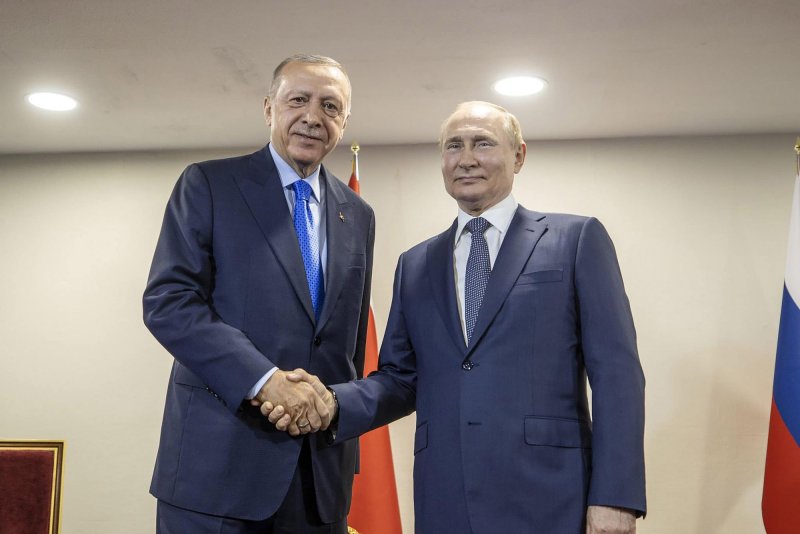1 of 2 | Turkish President Recep Tayyip Erdogan shakes hands with Russian President Vladimir Putin in July. The two leaders met Thursday to discuss plans to establish Turkey as a regional energy hub. File Photo by Iranian Presidential Office/UPI |
License Photo
Oct. 14 (UPI) -- Russia's deputy prime minister told Turkish media on Friday that, if the interest is there, Moscow can help establish Turkey as a regional energy hub.
The war in Ukraine has exposed the risk of deep vulnerabilities in the European energy sector. Ukraine hosts a dense network of Soviet-era pipelines meant to deliver products to the European market and the war has triggered a rush for alternatives for the sake of energy security.
Russia controls the twin Nord Stream natural gas pipeline system that avoids Ukraine with its route to Germany through the Baltic Sea, though that network is no longer in service due to geopolitical wrangling.
Russia also controls the TurkStream natural gas network that's meant to bring Russian supplies to Europe by way of Turkish territory. Alexander Novak, Russia's deputy prime minister, told Turkey's official Anadolu news agency there's the potential to pump more through Turkey in order to satisfy European demand.
Storage levels of natural gas are a concern for Europe ahead of winter in the Northern Hemisphere. Novak, a close ally of President Vladimir Putin, said Turkey -- a member of the NATO alliance -- could be a hub that would support regional gas deliveries.
"If there is such a need and all parties show interest, I think such a project can be evaluated," he said.
Delivering products through Turkey is no guarantee, however. Russian military intervention in Syria frustrated Ankara and its allies in the NATO alliance and the 2015 downing of a Russian military jet in Turkish airspace was met with measured anger by the Kremlin.
Progress on TurkStream was temporarily suspended several years ago amid simmering acrimony between the two countries. But ambitions from Turkish President Recep Tayyip Erdogan to serve as a broker between the Kremlin and Europe could be whetting Ankara's appetite for a more influential energy role.
Putin himself told Turkish officials there's a real opportunity presented by the regional energy crisis.
"If there is an interest from Turkey and our potential buyers in other countries, we could consider the possibility of building another gas pipeline system and creation of a gas hub in Turkey for sales to other countries, to third countries, primarily, of course, to European ones, if they are, of course, interested in this," he was quoted by The New York Times as saying Thursday.
They might not be interested. Europe is busy securing supplies from other countries such as the United States in the form of liquefied natural gas. LNG is delivered by ships and therefore lacks the same geopolitical risk associated with multinational pipelines.
Meanwhile, Massimo Di Odoardo, vice president for gas research at consultant group Wood Mackenzie, told the Times that existing pipelines are enough to feed Europe
"The idea that Europe needs additional pipeline capacity to obtain more Russian gas is not correct," he said.















